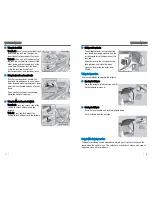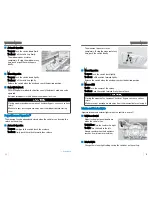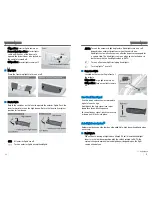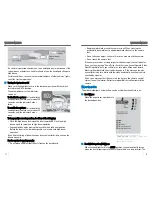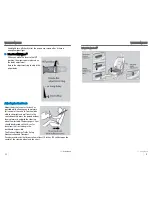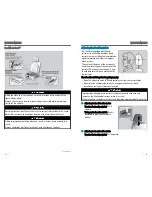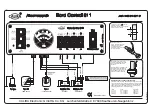
1. Locate the appropriate tether anchorage point and lift the cover.
2. Adjust head restraint
For outer positions: Remove the
cargo cover
*1
.Raise the outer head
restraint to its highest position, then
route the tether strap between the
head restraint legs. Make sure the
strap is not twisted.
For the center position: Lower the
center head restraint to its lowest
position, open the anchor cover,
then route the tether strap over the
head restraint.
3. Secure the tether strap hook onto
the anchor. Make sure the strap is
not twisted.
4. Tighten the tether strap as
instructed by the child seat
manufacturer.
Note: Always use a tether for forward facing child seats when using the
seat belt or lower anchors.
n
Protecting Larger Children
When a child is too big for a child seat, secure the child in a rear seat using
the lap/shoulder seat belt.
Have the child sit upright and all the way back, then ensure the following:
*1 - If equipped
SAFETY INFORMATION
20 |
• The child’s knees bend comfortably
over the edge of the seat.
• The shoulder belt crosses between
the child’s neck and arm.
• The lap part of the seat belt is as low
as possible, touching the child’s
thighs.
• The child can stay seated for the
whole trip.
If a lap/shoulder belt cannot be used
properly, position the child in a booster
seat in a rear seating position. For the
child’s safety, check that the child meets the booster seat manufacturer’s
recommendations.
Some U.S. states and Canadian provinces/territories require children to use
a booster seat until they reach a given age or weight (e.g., 6 years or 60 lbs).
Be sure to check current laws in the state or province/territory where you
intend to drive.
Allowing a child age 12 or under to sit in the front can result in injury or
death if the passenger’s front airbag inflates.
If a larger child must ride in front, move the vehicle seat as far to the rear
as possible, have the child sit up properly and wear the seat belt properly,
using a booster seat if needed.
Safety Label Locations
Safety labels are in the locations shown. They warn you of potential hazards
that can cause serious injury or death. Read these labels carefully.
If a label comes off or becomes hard to read (except for the U.S. dashboard
label which may be removed by the owner), contact a dealer for a replacement.
SAFETY INFORMATION
| 21




















